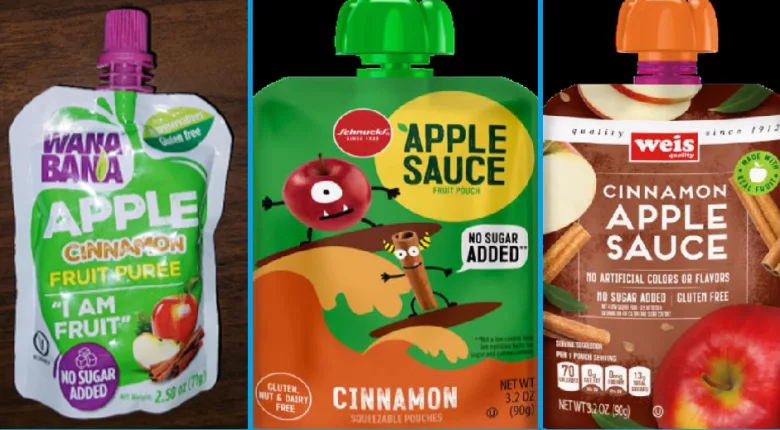Fruit Purees Linked to Growing Number of Child Lead Poisoning Cases, FDA Suggests Theory on Source of Contamination

Image credit: FDA
In late October 2023, the U.S. Food and Drug Administration (FDA) was alerted by the North Carolina Department of Health and Human Services (NCDHHS) to reports of children with high blood lead levels (BLLs), which NCDHHS linked to the consumption of WanaBana Apple Cinnamon Fruit Puree pouches after finding elevated levels of lead in the product. On November 13, 2023, the U.S. Centers for Disease Control and Prevention (CDC) posted an alert about the food safety incident's impact on public health. As of November 22, 2023, there are 52 known cases of acute lead poisoning potentially linked to the puree pouches.
FDA testing revealed WanaBana puree samples to contain lead at a level of 2.18 parts per million (ppm), which is more than 200 times greater than the action level FDA has proposed in a draft guidance for fruit purees and similar products intended for babies and young children.
The cases of lead toxicity span 22 states, and one unknown state: Alabama, Arkansas, California, Connecticut, Florida, Illinois, Louisiana, Maryland, Michigan, Missouri, North Carolina, Nebraska, New Hampshire, New Mexico, New York, Ohio, Pennsylvania, South Carolina, Tennessee, Texas, Virginia, and Washington. Patients are aged 1–4 years, and have BLLs ranging 4–29 micrograms per deciliter (µg/dL). The affected children experienced signs and symptoms including headache, nausea, vomiting, diarrhea, change in activity level, and anemia.
According to CDC, no safe level of lead in children’s blood has been identified. CDC does not use the term “elevated blood lead levels” when recommending what actions to take based on a child’s BLL; rather, CDC uses a blood lead reference value (BLRV) of 3.5 µg/dL to identify children with BLLs that are higher than most children’s levels.
Lead poisoning primarily targets the central nervous system. Children are more vulnerable to lead poisoning than adults because their nervous systems are still developing, and because children tend to absorb a higher fraction of ingested lead than adults. Although children with lead exposure may have no apparent acute symptoms, even low levels of lead have been associated with learning, behavioral, and cognitive deficits. A child who is exposed to large amounts of lead may develop acute lead toxicity, resulting in gastrointestinal, hematological, and neurological effects.
FDA Response and Product Recall
On October 31, 2023, Wanabana LLC initiated a voluntary recall of all WanaBana Apple Cinnamon Fruit Puree Pouches, and on November 9, the recall announcement was expanded to include Schnucks and Weis cinnamon applesauce pouches. Specifically, the recall includes:
- All lots of WanaBana Apple Cinnamon Fruit Puree pouches in 3-pack pouches of 2.5 ounces (oz.)
- Schnucks Apple Sauce 90 gram (g) pouches with cinnamon, lots 05023:19, 09023:22, and 09023:24
- Weis Cinnamon Apple Sauce 90 g, lot 05023:28.
WanaBana Apple Cinnamon Fruit Puree pouches are sold nationally and are available through multiple retailers including Amazon, Dollar Tree, and other online outlets. Schnucks-brand cinnamon-flavored applesauce pouches and variety packs are sold at Schnucks and Eatwell Markets grocery stores, while Weis brand cinnamon applesauce pouches are sold at Weis grocery stores.
Looking for quick answers on food safety topics?
Try Ask FSM, our new smart AI search tool.
Ask FSM →
The investigation of the adverse food safety event by FDA, NCDHHS, and the North Carolina Department of Agriculture and Consumer Services (NCDACS) is still ongoing.
During a November 13 webinar with FDA Deputy Commissioner for Human Foods James “Jim” Jones, a question was presented about FDA’s response to the situation around unsafe levels of lead in fruit puree products, and how it is improved in comparison to FDA’s handling of the 2022 infant formula crisis precipitated by product contaminated by Cronobacter sakazakii. Mr. Jones highlighted the agency’s relatively rapid response, having worked with WanaBana to initiate a voluntary recall within four days of being alerted to the problem by NCDHHS. He attributed FDA’s improved response time to the ongoing reorganization of the agency’s Human Foods Program, as having a clearer chain of command has enabled more efficient and hastened decision-making.
Mr. Jones also alluded to a “theory that FDA has its arms wrapped around” regarding the source of contamination of the fruit purees. Although the theory is not yet confirmed, the agency has reason to believe that the products contain elevated levels of lead due to an imported ingredient used in the brands’ recalled purees. He stated that FDA is working diligently to remove the contaminated ingredient and products from the U.S. market, although it is difficult to know just how widespread the distribution of the possibly implicated ingredient may be in the U.S.
Update, November 17, 2023: The article has been edited to reflect new information provided by FDA regarding the growing number of lead toxicity cases and the results of sampling and testing of WanaBana Apple Cinnamon Fruit Puree pouches.
Update, November 20, 2023: FDA has provided an update on its unconfirmed theory about the source of contamination, stating: "FDA’s leading hypothesis is that cinnamon [imported from Ecuador] used in these recalled pouches is the likely source of contamination for these products; however, FDA has not yet been able to collect and test samples of the cinnamon used in the recalled products. FDA is continuing to work with Ecuadorian authorities to investigate the source of the cinnamon. At this time, FDA has no indication that this issue extends beyond these recalled products, but to further protect public health, the FDA is screening incoming shipments of cinnamon from multiple countries for lead contamination."
Update, November 22, 2023: There have been 52 reports of illness potentially linked to the recalled product submitted to FDA. To date, confirmed complainants are less than 1 to 4 years of age. FDA is continuing to evaluate incoming adverse event reports. FDA is aware that recalled WanaBana Apple Cinnamon Puree is still on the shelves at several Dollar Tree stores in multiple states. FDA is working with the firm to ensure an effective recall.
Update, December 1, 2023: There have been 57 reports of illness potentially linked to the recalled product submitted to FDA. To date, confirmed complainants are less than 1–5 years of age.
On November 30, 2023, Austrofood, along with Wanabana USA, the distributor of WanaBana products in the U.S., released a statement that reports that Wanabana has conducted a root cause investigation. Based on the investigation, the firm’s leading hypothesis to date is that cinnamon is the source of the elevated lead levels in the recalled products. Wanabana USA and Austrofood state that the cinnamon used to manufacture the recalled products was supplied by Negocios Asociados Mayoristas S.A., operating as Negasmart, a third-party distribution company located in Ecuador.
FDA is continuing to work with Ecuadorian authorities to investigate the source of the contamination and to determine if the cinnamon in the recalled products was used in other products or distributed as a raw ingredient to other countries. FDA has confirmed that Negasmart does not import cinnamon directly into the U.S.
FDA’s investigation is ongoing to determine the point of contamination and whether additional products are linked to illnesses. At present, FDA has no indication that the issue extends beyond the recalled products, but to further protect public health, FDA is screening incoming shipments of cinnamon from multiple countries for lead contamination. As of November 30, there have been no screening results that have tested positive for higher levels of lead. Separately, Austrofood CIA LDA’s apple cinnamon fruit puree pouch products exported to the U.S. were added to Import Alert 99-42, detention without physical examination of foods due to heavy metal (toxic element) contamination.
Update, December 6, 2023: FDA has initiated an onsite inspection at the Austrofoods facility located in Ecuador. Ingredient sample collection is underway. FDA is continuing to coordinate with Ecuadorian authorities on the investigation of the source of elevated lead levels in cinnamon apple pouches. In addition, the Ecuadorian authorities report that Negasmart's cinnamon had higher levels of lead than allowed by Ecuador and that Negasmart, the supplier of cinnamon to Austrofoods, is currently under an Ecuadorian administrative sanctions process to determine the responsible party for the contamination.
As of December 5, 2023, FDA has received 64 reports of adverse events potentially linked to recalled product. To date, confirmed patients are under six years of age. FDA included adverse event reports submitted directly to the agency that note blood lead levels at or above 3.5 µg /dL BLLs within three months after consuming recalled product. FDA is continuing to evaluate incoming adverse reports of illnesses.
Additionally, as of December 1, CDC has received reports of 18 confirmed cases, 30 probable cases, and 4 suspected cases from 13 different states through their reporting structure.
CDC and FDA have different data sources, so the counts reported by each agency will not directly correspond. In addition, some people who were affected by the contaminated product might be reflected in both the numbers reported by the FDA and the numbers reported by CDC, so the numbers should not be added together.
Update, December 13, 2023: FDA is conducting an onsite inspection at the Austrofoods facility located in Ecuador. Cinnamon samples collected from the lots used in recalled products will undergo laboratory analysis.
FDA has worked with Ecuadorian authorities to gather information about Negasmart, the supplier of cinnamon to Austrofoods, including whether the cinnamon in the recalled products was used in other products exported to the U.S. Working together with Ecuadorian authorities, FDA has confirmed that, of Negasmart’s direct customers, only Austrofoods ships product to the U.S. In addition, FDA has confirmed that Negasmart does not directly export products to the U.S.
As of December 11, 2023, FDA has received 65 reports of adverse events potentially linked to recalled product. To date, confirmed complainants, or people for whom an adverse event was submitted, are under 6 years of age. As of December 8, CDC has received reports of 46 confirmed cases, 68 probable cases, and 11 suspected cases for a total of 125 cases from 22 different states through their reporting structure.
Update, December 18, 2023: FDA’s onsite inspection of the Austrofoods facility in Ecuador has ended. However, the FDA investigation of the elevated lead levels in recalled cinnamon applesauce pouches continues. During the inspection, investigators collected samples of cinnamon supplied by Negasmart to Austrofoods. These samples have undergone analysis and results show extremely high levels of lead contamination, 5110 parts per million (ppm) and 2270 ppm. For context, the Codex Alimentarius Commission is considering adopting a maximum level of 2.5 ppm for lead in bark spices, including cinnamon, in 2024.
FDA has tested multiple products and, based on the current evidence, there are no further products being added to the recall at this time. Additionally, FDA and state partners have tested at least 136 samples of non-cinnamon containing products and all have been negative for elevated lead levels. Of those, 136 non-cinnamon containing samples, eleven are the Smoothie Mango Passionfruit Banana flavor of WanaBana purees, three of these samples are of the same lot that the Agencia Nacional de Regulación, Control y Vigilancia Sanitaria (ARCSA) originally reported as positive for lead, and FDA results were negative for elevated lead for all samples. In addition, FDA collected samples of WanaBana Organic Mango Puree at import and sample results are negative for elevated levels of lead.
At present, FDA is still relying on officials in Ecuador to support the investigation into Negasmart. To date, FDA has confirmed that Negasmart does not ship product directly to the U.S. and that, of Negasmart’s direct customers, only Austrofoods ships product to the U.S.Further, Ecuadorian officials from ARCSA report that Negasmart does not ship product outside Ecuador. ARCSA also reports that in their testing thus far, raw/unprocessed cinnamon from all cinnamon importers in Ecuador do not appear to be contaminated with lead, whereas the ground or powdered cinnamon from Negasmart is contaminated. The Ecuadorian processor used by Negasmart is not currently operating.
While the agency's information indicates that, in the U.S., the contaminated cinnamon is limited to only the applesauce products that have already been recalled, FDA is still investigating whether the cinnamon in the recalled products was used in other products exported to the U.S. To date, increased screening for imported cinnamon from certain countries remains in place and FDA has no indication that this issue extends beyond these recalled products.
Update, December 19, 2023: Jim Jones, the new Deputy Commissioner for Human Foods at FDA, told Politico that the recently recalled, lead-contaminated applesauce packages may have included intentionally adulterated cinnamon. FDA’s theory is unconfirmed as the investigation is ongoing, but according to Mr. Jones, all the information gathered thus far points to economically motivated adulteration of cinnamon used in the pouches by an actor along the supply chain. Read more, including continued updates to the story, here.









